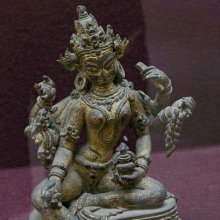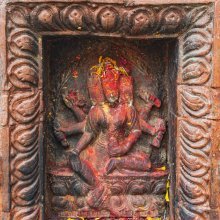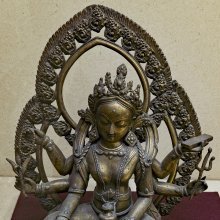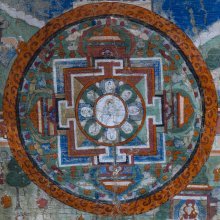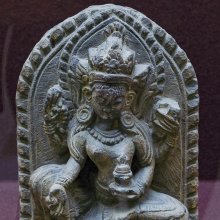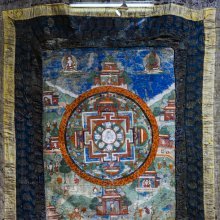Vasundhara, Vasundharā, Vasuṃdharā, Vasumdhara, Vasumdhara: 26 definitions
Introduction:
Vasundhara means something in Buddhism, Pali, Hinduism, Sanskrit, Jainism, Prakrit, the history of ancient India, Marathi, Hindi. If you want to know the exact meaning, history, etymology or English translation of this term then check out the descriptions on this page. Add your comment or reference to a book if you want to contribute to this summary article.
Vasundhara has 25 English definitions available.
Images (photo gallery)
(+4 more images available)
Languages of India and abroad
Sanskrit dictionary
[Deutsch Wörterbuch]
Source: Cologne Digital Sanskrit Dictionaries: Böhtlingk and Roth Grosses Petersburger WörterbuchVasuṃdhara (वसुंधर):—
1) adj. Schätze bergend [Harivaṃśa 7426.] —
2) m. a) pl. Bez. der den Vaiśya entsprechenden Bewohner von Plakṣa [Bhāgavatapurāṇa 5, 20. 11.] — b) Nomen proprium eines Mannes [Kathāsaritsāgara 57,7.] eines Dichters [Oxforder Handschriften 124,b,30.] [Weber’s Indische Studien.8,389.] —
3) f. ā a) die Erde; Land, Reich [Vopadeva’s Grammatik 26, 60.] [Amarakoṣa 2, 1, 3.] [Hemacandra’s Abhidhānacintāmaṇi 935.] [Halāyudha 2, 2.] hastyaśvarathaghoṣeṇa pūrayanto vasuṃdharām [Mahābhārata 3, 2114. 4, 554.] [Rāmāyaṇa 2, 88, 18. 110, 4.] [NṚS. TĀP. Upakośā] in [Weber’s Indische Studien 9, 77.] [Raghuvaṃśa 4, 7.] [Varāhamihira’s Bṛhajjātaka S. 18, 2.] [Rājataraṅgiṇī 1, 101.] ardhasaṃjātasasyeva toyaṃ prāpya vasuṃdharā Land, Boden [Mahābhārata 3, 3007.] vasuṃdharevoptavījā [Śākuntala 151.] nīla [Varāhamihira’s Bṛhajjātaka S. 54, 104.] pibatyasṛgbhūri raṇe vasuṃdharā [36, 5.] vasuṃdharāyāṃ patitā Erdboden [Rāmāyaṇa 3, 68, 40.] pṛṣṭhe patitaḥ [Pañcatantra 101, 23.] — b) Bez. eines Theilchens der Prakṛti [Oxforder Handschriften 23,b,2.] — c) Name einer buddhistischen Göttin [WILSON, Sel. Works II, 13. 22.] — d) Nomen proprium einer Tochter Śvaphalka’s [Harivaṃśa 2085.] einer Fürstin [Daśakumāracarita 194, 15.] — e) du. Bez. zweier Kumārī an Indra's Banner [Varāhamihira’s Bṛhajjātaka S. 43, 40.]
Sanskrit, also spelled संस्कृतम् (saṃskṛtam), is an ancient language of India commonly seen as the grandmother of the Indo-European language family (even English!). Closely allied with Prakrit and Pali, Sanskrit is more exhaustive in both grammar and terms and has the most extensive collection of literature in the world, greatly surpassing its sister-languages Greek and Latin.
See also (Relevant definitions)
Partial matches: Vasum, Dhara, Tara.
Starts with: Vasundharamahavidya, Vasundharendra.
Ends with: Bahuraratnavasundhara, Nanaratnavasundhara, Shrivasundhara.
Full-text (+59): Vacuntarai, Kavirajavasumdhara, Vasumdhareya, Vasumdharaprishtha, Vasumdharashunasira, Vasumdharadhara, Vasumdharadhava, Agamya, Vasumdharabhrit, Vasumdharesha, Varadhara, Kaviraja, Saptadvipa, Shunashira, Nishkaurava, Aparyaptavat, Vasu, Uta, Andolanem, Vasudha.
Relevant text
Search found 31 books and stories containing Vasundhara, Vasum-dhara, Vasuṃ-dhara, Vasuṃ-dharā, Vasuṃdhara, Vasuṃdharā, Vasuṃdhara, Vasumdhara, Vasumdhara, Vasuṃdharā, Vasun-dhara, Vasun-dharā, Vasundharā; (plurals include: Vasundharas, dharas, dharās, Vasuṃdharas, Vasuṃdharās, Vasumdharas, Vasundharās). You can also click to the full overview containing English textual excerpts. Below are direct links for the most relevant articles:
Trishashti Shalaka Purusha Caritra (by Helen M. Johnson)
Part 1: Birth of Aparājita < [Chapter II - Sixth incarnation as Aparājita]
Part 2: First incarnation as Dhana < [Chapter I - Previous incarnations of Ariṣṭanemi (Nemi)]
Part 2: Previous births of Nandana < [Chapter V - Dattanandanaprahlādacaritra]
Garga Samhita (English) (by Danavir Goswami)
Verse 1.3.37 < [Chapter 3 - Description of the Lord’s Appearance]
Verse 4.8.37 < [Chapter 8 - In the Story of the Yajña-sītās, the Glories of Ekādaśī]
The Markandeya Purana (by Frederick Eden Pargiter)
Vastu-shastra (5): Temple Architecture (by D. N. Shukla)
Sanskrit sources of Kerala history (by Suma Parappattoli)
6. Samudrabandha’s commentary on the Alankarasarvasva < [Chapter 6 - Miscellaneous Sanskrit works bearing on Kerala history]
Chaitanya Bhagavata (by Bhumipati Dāsa)
Verse 2.8.190 < [Chapter 8 - The Manifestation of Opulences]
Verse 1.2.49 < [Chapter 2 - The Lord’s Appearance]
